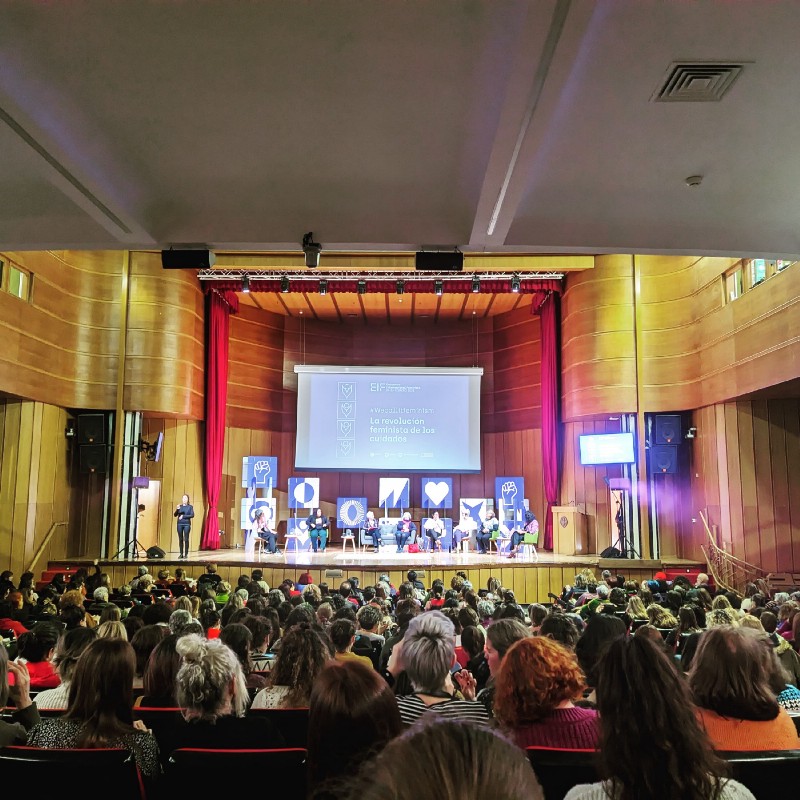The revolution of care
This weekend I had the pleasure and opportunity to be part of the International Feminist Gathering in Madrid. I arrived there overwhelmed by the number of people I encountered and left with a bag full of teachings and hope for the future.
Yes, you’ve read it well, I said hope. When we think of feminism we often think of angry women complaining about the gender gap or violence, but feminism has engulfed not only patriarchy’s consequences but also its causes. This means that we are addressing the route of various problems unifying people in a single social movement that aims to ensure a dignified life for everybody taking their differences into consideration.
For more than 24 hours we listened to great thinkers like American philosopher Judith Butler redefining the analysing of the current situation of feminism; scientist Vandana Shiva talking about the climate crisis and how it affects women and racialized people the most; Argentina’s Spokeswoman Gabriela Cerruti highlighting the struggle we confronted to win abortion rights, and even more, to keep them; or Nicaraguan journalist Patricia Orozco stressing the importance of unpaid labour — care of children, dependent people and household — as the sustaining element of our society’s ground.
And that’s where the fourth feminist wave is heading: CARE. Our current socioeconomic system only considers that something is generated when the outcome of the work done is money. It doesn’t matter which means are necessary or the side effects. Only a number followed by the symbol of a coin is valued. Within the feminist movement, it has been proposed to redesign the current system to achieve a community focused on people in contraposition to the production-based society we are experiencing. In other words, instead of focusing on generating productivity, we would be concentrating our efforts on generating equality and well-being.
They have also raised concerns about the widespread idea that the economy seems to be understood only from a neoliberal perspective. We find proof of it in public debates that don’t allocate time to discuss the alternatives. Also, as evidence of its neglect, we often see the lack of resources to both educate and investigate those other economic systems that walk away from perpetual growth and fixate their actions on sustainability.
The political and economic scientist Maria Ángeles Durán has stated that neoliberalism leaves very little space in conversations for other types of economy. Capitalism has monopolized university classrooms burying all alternatives. But, fortunately, not everybody has fallen prey to such orchestrated deception. Durán managed to push the research on other types of economic systems and arrived at a conclusion:
Our current economy studies the scarce goods and gives them a price, now we propose an alternative economy that would study what can’t be given a price.
She was talking again about breeding, upbringing and care, the cornerstones of capitalism, a civil religion that wouldn’t be possible without healthy and educated people available to work for those businesses and corporations that claim to sustain our communities.
Ecofeminism has warned us all of the inevitable degrowth we are already undergoing which won’t be resolved as resources are limited and sequestrated by only a few. Yayo Herrero (anthropologist, engineer and professor) has given a very clear message:
“The degrowth of the materialistic realm of the economy is not an option but a piece of information, is there and it’s happening (…) Whether we like it or not, the majority of humans on this planet are going to live with less energy, fewer materials and fewer land resources, simply due to a matter of translimitation…”
We are running out of time for technology to do its magic. We need to support whatever scientific developments we can achieve with a revolutionary social change, otherwise, we’ll keep facing disturbing situations like the fact that fertile-aged women in México are showing health-threatening chemicals in their breast milk due to the elevated use of pesticides that intensive agriculture and other forms of extractivism require. The persistent organic pollutants (POPs) can be transferred through the placenta and breast milk to the developing human offspring, literally, the future of humanity.
Feminism is not a fight against men. It’s a fight against the patriarchal system, a fight against the establishment that would actually benefit everybody.
The fourth feminist wave sees care not only as the economic empowerment of women but as the civilizing act that reorganizes society and fosters violence prevention leading us towards a peaceful future. The feminist revolution of care has begun and we should all be excited about it.
Support the author and get the latest publications subscribing to:
Look at her latest book 📕, En Brandán

